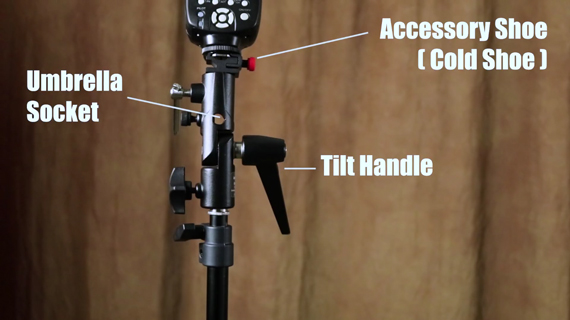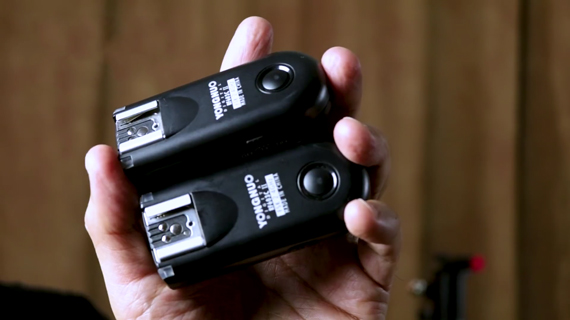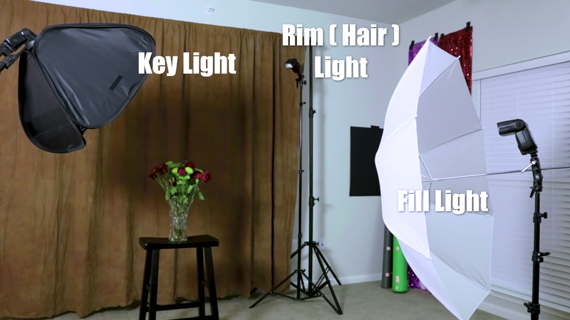One common mistake that beginners make when starting out with flash photography is that they get comfortable with using a flash mounted on the hot shoe of the camera. They’re not aware of the potential that those flashes have when used off camera. Photographer Ed Verosky explains how you can remotely trigger your flash and use one or more light setups:
To get started with off-camera flash photography, you need the following:
One you have everything, put them together as shown in the image below, and you’re ready to go. Also, keep in mind that you can adjust the height of the flash by using the knobs on the light stand and also adjust the angle of the flash using the swivel bracket’s tilt-adjustment handle.

Triggering the Flash with Your Camera
If the flash isn’t mounted on the camera, how do I trigger it while taking photos? Don’t worry. The following methods ensure that the flash fires when you take a photograph.
If you’re just starting out with flash photography, you might be better off getting a flash unit that is compatible with your camera and supports Through The Lens (TTL) metering. This is basically an “Auto Mode” for flash wherein the power of the flash is decided automatically depending on your camera settings.
- If you use your flash in TTL mode, you can use a dedicated TTL Sync Cord. One end of the TTL Sync Cord is connected to the flash on the light stand and the other end to the camera.
- You can also set up the flash as an optically triggered TTL slave unit. When you use this method, the flash can be triggered by using the built-in flash in your camera or by using a special transmitter.
If you’re comfortable setting the flash power manually (i.e. no TTL), then you just need an arrangement to fire the flash when you press the shutter button. For this, you can get radio flash triggers that act as a transmitter-receiver set. You mount the transmitter on your camera and the flash to another receiver unit and you’re set to go. However, as briefed earlier, you will need to set the power of the flash manually so make sure the camera allows you to set it manually. There are manufacturers who have flash units with built-in receivers that are compatible with their transmitters. In such case, you do not need an extra receiver.

Flash transmitter-receiver set
Ways to Use Flash
Now that your flash is mounted on the light stand and ready to be triggered, you can use several methods depending on the look you are going for.
- Unmodified / direct flash can produce a harsh light that creates harsh shadows
- Bouncing the flash off white walls and ceilings creates a softer light with softer shadows
- Using a shoot-through umbrella also creates a softer light with softer shadows but spills light elsewhere too. You can also use a softbox to cut down on light spill and have more control on where the light goes.
Types of Lighting Setups
Depending on what type of look you’re going for, you can opt either for a single light or multiple light setups.
- A single light setup is very directional. It brightens the side from which the light strikes the subject while the other side is darkened with shadows.
- To have some amount of fill on the shadow side and to make the shadow a little softer or to completely eliminate it, you can use another flash on the shadow side of the subject. To have a classic two-light setup, down the power of the second light (fill light) to about half of the initial light (key light).
- If you like, you can add a third light to the setup which accentuates the edges of the subject and separates it from the background. It is known as a rim light / hair light / accent light. This forms a three-point lighting setup.

Keep in mind that using all of these lights is not necessary; you can add or subtract light depending on what kind of look you’re going for. Also, experiment with modifiers and flash powers and achieve different looks from the same lighting setup. Off camera flash photography is simple with a little bit of practice and can yield great results. Keep practicing!
Go to full article: Off Camera Flash Photography Tutorial
What are your thoughts on this article? Join the discussion on Facebook
PictureCorrect subscribers can also learn more today with our #1 bestseller: The Photography Tutorial eBook
The post Off Camera Flash Photography Tutorial appeared first on PictureCorrect.
from PictureCorrect https://ift.tt/2PnMQuS
via IFTTT






0 kommenttia:
Lähetä kommentti